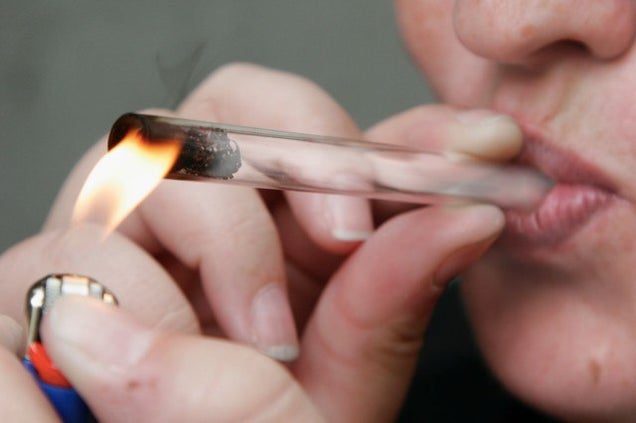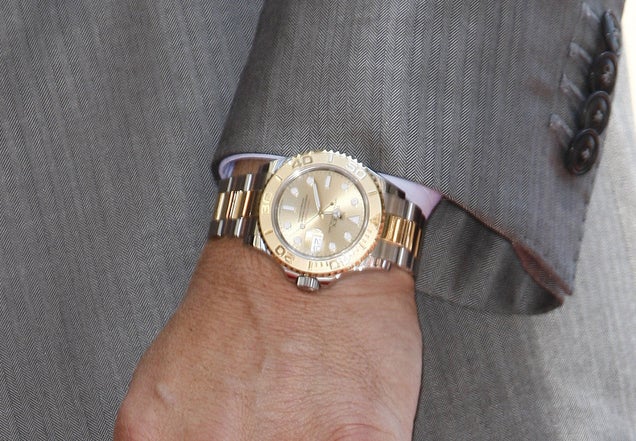![The Game I Played When I Was Scared To Death of Being Deported]()
Amidst the pushcart vendors selling bacon-wrapped hot-dogs, religious leaders blasting damning sermons over megaphones, and the homeless wandering around the city, there is one San Francisco fixture most people don't know about—not even the locals. It's not a bridge or a winding street or anything like that: I'm talking about certain folk who roam San Francisco streets. People who can give you the credentials that make your life actually matter.
Most folks may not notice them, but you can rest assured they'll notice you if you walk by. Your face is an open book to them: they can glean your ambitions and dreams and aspirations—your entire life story—all with a quick glance. If you have a certain air about you, if they sniff out a certain dire situation, they'll offer you a small miracle. All you need is a few fake documents, which they procure with ease—for a price, of course—and voila. You've got a new life.
It starts with a new name. For many people who come to this country, using fake papers to temporarily adopt a new name, or a slightly different name, is practically a rite of passage. Here's how I've seen it go down with some of my own family and friends. They grow up in a third world country, spending years saving up to pay a "coyote" to lead their trek across the United States border—an undertaking so grueling, chance are good that the person taking the 'trip' is young and foolish. If they manage to survive the Mexican desert, and if the coyote doesn't decide to rape them or suddenly hold them hostage until their family agrees to pay way more than they initially agreed to, then they make it into the country—only to have to figure out how to find work, get (under)paid, and do their taxes. For many, this means fake papers—which you can get if you know who to look for.
The people selling fake papers, they'e never talked to me, personally. They can tell I'm an American, I think. And so, I'd almost forgotten they existed, if it wasn't that I made the mistake of losing both my ID, and eventually, my passport—this is apparently what happens when you get drunk watching go-go dancers at a gay bar. That makes the entire thing sound kind of silly, but don't get me wrong here: not having identification on me was straight up terrifying.
I remember having people disappear in my life because they were at the wrong place at the wrong time.
I grew up with stories about "redadas." Police or immigration officers would descend onto a workplace or a home, despite not having a warrant. Sometimes, they'd ask for papers. Sometimes, they didn't give a fuck and they'd just plain arrest everyone, legal or not. No amount of sweet talk or knowledge about laws—which might prohibit or at least limit the ways the raids take place—could save you. Off to Mexico you went, even if you weren't Mexican, with whatever you happened to have with you at the time.
I remember having people just…disappear in my life because they were at the wrong place at the wrong time. It was such a common occurrence that I'd watch comedy movies about young, attractive Latinos getting mistakenly deported on major Spanish channels every weekend. What could anyone do about it all, really, except laugh and hope it never happened to them?
In the two weeks I didn't have anything on me that could prove I was who I said I was, I became an anxious mess. I became sensitive to every crack about my race, sensitive to every glance from a white person who seemed to ask me what I was doing in their five-starred Yelp reviewed restaurant—didn't I know that establishments for 'my kind' could never be found on a damn smartphone app? I know it was me being paranoid, but when you consider the class and race tensions that have arisen in San Francisco thanks to the tech boom, and when you consider the sort of thing I grew up around, could you blame me? I sometimes feel unwanted in this city even when I have all my documentation on me!
During the time when I didn't have papers with me, everything ate at me. Even being home felt unsafe, somehow—I'm the only person of color I've met my admittedly affluent San Francisco neighborhood, and if I worried that one day I'd be coming home past midnight and someone would call the cops on the mischievous-looking (read: not white) girl who didn't look like she belonged there before, it only got worse when I had no ID on me.
During those two excruciating two and a half weeks, I did as any nerd probably would: I took refuge in a make-believe world where I didn't have to worry about my race or my temporary lack of papers. A place that could grant me control. I'm talking, of course, about a video game.
![The Game I Played When I Was Scared To Death of Being Deported]()
Everyone who tries to pass through an immigration checkpoint has a story, both in real life and in the indie computer game, Papers, Please. Maybe they're visiting family. Maybe they're looking for work. Maybe they're taking refuge. Maybe they're just taking a vacation. Or sometimes—and this is probably way more common in the game than in real life—they might be something a bit more dangerous. Maybe they're a smuggler. Maybe they're a terrorist. Just the same, regardless of their intentions, everyone in Papers, Please hands you some documents—passports, ID cards, work permits—and tells you the purpose of their visit.
Your job is to inspect the documents and try to spot discrepancies, if not catch any suspicious behavior (whatever that means)—which is to say, you are the arbiter of the fate of the undocumented. Obviously, it's the sort of job you want to treat with utmost care. Thing is, when there are dozens if not hundreds of tired-looking people waiting in line, when you've spent hours checking that every number on every document is correct, when you've spent hours making sure that the face on the flimsy square piece of paper matches the person standing in front of you, and when you can't keep track of all the new, sometimes arbitrary laws about immigration, you start feeling more and more detached from the people trying to cross the border. Everything and everyone becomes suspicious. You start doubting your own judgement, and start double, triple checking the same damn things—and it won't matter, because you'll still somehow let someone with a bomb through. It's the sort of game post 9/11 America has been trained to play, almost.
![The Game I Played When I Was Scared To Death of Being Deported]()
So, the more you play, the more you notice your little stall and the way you can barely fit all the documents, letters and rulebooks and governmental edicts is incredibly claustrophobic. You start wondering how long it will take for you to crack, ever-aware that a simple task has somehow become gargantuan, impossible—and that if you mess up too many times, it won't be hard to find someone to replace you. The joys of living in a dystopian world.
Me, I'm used to being on the other side of that sort of interaction. I'm used to being with my family, who would hand over (sometimes false) documentation, since I typically acted as the translator. It's the sort of experience that makes playing Papers, Please feel a little surreal.
One of the things that particularly struck me about Papers, Please is just how often either terrorists or people with obviously fake papers tried to cross the border. You'd have to have lost your damn mind to put yourself in a situation where you're choosing to give an officer your fake papers out of your own volition—obviously, it happens sometimes, but in my experience, people who get fake papers hope they never have to use them. The fake papers are a last resort, the sort of thing that you present when you've fucked up.
![The Game I Played When I Was Scared To Death of Being Deported]()
As an example, prior to getting the paperwork to be here legally, my stepdad had a driver's license that he bought from an infomercial—yes, there's an industry built around tricking people into spending money to acquire documentation that is actually legally useless—which he carried around with him. He still drove around with the utmost of care and, to be frank, paranoia, to try to ensure he'd never get pulled over—because if he did, it wouldn't take long for the officer to figure out the card wasn't legit. Other times, you'd have people gamble on not showing anything at all—I remember this one time when I was little where an uncle was driving, but the officer let him go after I promised him we were driving straight home and it was nearby.
I mean, even if they did carry around top-notch documentation, it wouldn't really matter. Fear can rule you, and often dictates the way you carry yourself. When you're in this country illegally, you become so fearful of being sent back (to poverty, to violence, away from your family, or the world you've gotten used to), you become obsessed with presenting the right way—having the right clothes, sure, but also obsessed with the idea of 'acting' American. You may be asking yourself, what in the world does that even mean? Truthfully, I don't have a clear-cut answer for this. It's something I grapple with every day, after growing up poor and moving up to middle class by way of the tech industry. Still, there are times I become keenly aware that it's a thing—like when I'm in line in an all Latino neighborhood where the cashier speaks in Spanish to everyone except me, even after I make it clear I can speak Spanish too, even after it's clear that the cashier can't actually speak English, either.
They can tell, just like the people selling fake papers can tell, too. So it dawns on me that a ton of people who come to this country illegally aren't just likely to adopt menial, sometimes degrading jobs, but they also learn how to become actors. Actors who are capable of convincing everyone around them that they're an American, too. But the top prize for some of the best actors of our time isn't an Oscar: it's being allowed to stay in this country, just like the rest of us. When you consider how hyper-vigilant people become about the way they come across, you could say the 'movie' everyone is acting in feels like something in the vein of 1984.
The top prize for some of the best actors of our time isn't an Oscar: it's being allowed to stay in this country.
These are the sort of things I think about whenever I look at someone who is trying to cross the border in Papers, Please—because I know that if everything checks out, documentation-wise, there are probably more nuanced things that go way beyond simple Visas and IDs that influence the way I judge someone, though perhaps the game doesn't account for/test me on it. The way people answer when I interrogate them, for example. How fluent they are in English. The color of their skin. Their profile in relation to their name—in real life, you might be able to get perfectly forged papers, but there's still the question of whether or not you "look" like the name on the documentation. Think about McLovin in Superbad, for example.
I also became suspicious of people I have absolutely no reason to be suspicious of in the game—that's the sort of oppressive environment the game cultivates, even without featuring real nations or races. I can only imagine how telling, racism and class-wise, a game like this would be if it did. Of course, the situation isn't helped when you consider that in Papers, Please, the government has taken your family and that every mistake that you make costs you money—money that you need for heat, rent, food and medicine. When that's the case, hearing the real, human stories behind the obviously fake ID cards may not be enough. Do you want to be a hero—this is a video game, remember?—or do you want to provide for your family? Is smuggling someone through the border worth it if it might mean your family goes hungry? What if you were the only thing standing between them and the hope for a better life?
![The Game I Played When I Was Scared To Death of Being Deported]()
I empathize with the character and his unfortunate situation, but only to a certain degree. I don't know, there's something about your role as an immigrations inspector that reminds me that even when a game manages to be different from most, it's still likely to have a hell of a hard time giving you a role that isn't defined by power. You're in control of the lives of so many people—you can even choose to play a small part in taking down the government, if you play your cards right. And when I think about things like how my grandmother likes to go off about a time before you needed a piece of paper to prove the land you lived on for generations is actually yours, the fact that your chief activity in the game is sorting through paperwork makes the game feel profoundly white, profoundly of an empowered class. A well-disguised power fantasy, if you will.
It's an interesting, worthwhile game, to be sure—but I end up wondering, as I do with so many games that put me in the same, tired roles, what it would be like to play as the disenfranchised. It seems like it would make for a fascinating story, no?
![The Game I Played When I Was Scared To Death of Being Deported]()
It took me a lot of gritting my teeth, laying low, and a lot of paperwork to get my ID and passport back. The experience pales in comparison to the decades some people in my family had to wait before they could legally acquire certain documentation to live in this country, though, obviously. Funnily enough, of all people, it was my stepdad who ended up coming down with me to the passport agency to swear to an immigrations official that I was, in fact, Patricia Hernandez. The officer didn't even look up the entire time we were there, just like I sometimes didn't even look at the person standing in front of me in Papers, Please if all the other parts of their paperwork seemed to check out.
The real-world immigrations official couldn't see how scared I was because a different security officer joked about how Mexican I seemed, and she couldn't see how excited my stepdad was to be able to whip out his legitimate, hard-earned ID card. We weren't people, not really—just names and signatures to mail out and file away.
NEXT.



































